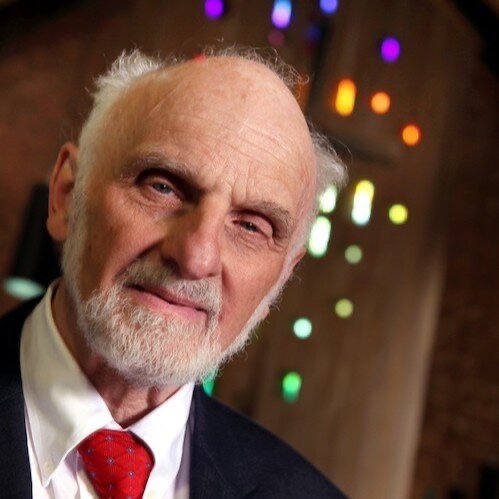Walter Brueggemann Column
Church Anew is honored to host Walter Brueggemann as our featured columnist. We look forward to sharing Walter’s work with church leaders and faithful people worldwide. May his powerful and reflective writings inspire, energize, guide, and comfort you.

Finding Your Voice
Newman writes in an almost gnomic style with abrupt half-sentences, wistful unfinished thoughts, and frequent appeal to “threes” that he finds suggestive. The crux of his elusive work is to report on the way in which good writing must adhere to conventions of plot, structure, and genre.

The Goodly Company of “the Good Mrs. Murphy”
The dominant Western theological tradition has been mesmerized by the muscular adjectives of sovereignty…that we have until most recently failed to discern the force of another set of divine characteristics, namely, “goodness and mercy.”

The Empowering, Illuminating Word From Elsewhere
In Psalm 119, by contrast, each letter gets eight successive lines. Thus with twenty-two letters in the alphabet, and each letter reiterated eight times, we get a sum of 176 verses. It is for that reason that the Psalm is so long. Our verse 105 occurs as the first of eight verses that start with nun (n) (vv. 105-112). The first word in verse 105, the first of eight lines with nun, is “ner” (lamp).

When Water Does Not Win
In its pre-scientific articulation of creation, ancient Israel understood that the created order of the world is sustained by the creator God who held back the chaotic waters that were all around the earth, and that were endlessly moving against the created order in threatening ways.

Let's Do The Numbers
The numbers are transformative, restorative, and emancipatory, a wholesale contrast to the numbers of Solomon that brought with them nothing of transformation, restoration, or emancipation.

The Slow Speed of Comfort?
The summons of this mismatch must be, in some complex way, a summons away from scale and speed in order to recover our capacity for compassion and empathy, our capacity to pause amid our rush to mastery, and to respond with serious attentiveness that takes time.

The Good Shepherd And The Bad Ones
The vision of the prophet revolves around the conviction that the purpose of government is the protection and wellbeing of the vulnerable, exactly a contradiction to the neoliberal practice that is programmatically exploitative of the vulnerable.

On Being Fit
No doubt all of us have a stake in “being fit.” But we have great disagreement upon that for which we may be appropriately “fit.”

Unshakeable Systems?!?
In church we do not claim that “history” is the active agent in “overturning and upending.” Rather we say it is the Lord of history, the one we confess in Jesus of Nazareth, who in cunning, hidden, and resolved ways does the overturning amid history.

In Praise of Thickness
The Bible, of course, is a collage of many rules. It is important, in the Bible as in our society, to distinguish between thick rules and thin rules.

Hair: Marker of Manhood?
There is a series of texts in which the marker of hair strikes one as odd and noticeable, until we recognize that hair as taken as evidence of maleness. Thus Jacob expresses his anxiety about his lack of hair

Two Kinds of Truth
Thus everywhere in scripture the issue is joined between these two kinds of truth. One truth is top-down. It originates in and serves the aims of established power. It tends to be quantifiable, provides certitude and security, and grows always more abstract. The alternative truth embodied in and performed by Moses, Elijah, Elisha, and Jesus is bottom-up.

Moving Beyond Imagination--but Not Really: A Reflection from Brueggemann’s Biographer
A brief peek into the prophetic imagination of Walter Brueggemann as captured by his biographer, Conrad Kanagy.

Reflections of My Childhood
It occurs to me that this deep conviction of God’s providential care (that as instanced for me by my dad) is best sung, because it does not conform to our conventional adherence to patterns of “cause and effect.” That is, it dwells outside of our common rationality and invites us to think in alternative categories.

A Preacher's Dilemma: Verse 12?
The first, very important task of exegesis was to determine the extent of the textual unit, where it began and where it ended. This is often clear and self-evident in scripture; but sometimes it is not. Jeremiah 18:1-11 and Jeremiah 18:1-12 offer somewhat contradictory, but equally valuable, interpretations of scripture that can be relevant to modernity and thus strategic to ministry.

The Dangerous Arson of a Bramble
When good leadership does not step up to responsibility, it may go by default to nefarious control of others who intend no positive outcome for the common good.

Rescinding Absolutes
It turns out, through the repudiation of the doctrine by Pope Francis, that no “absolute” that stands against human dignity and human wellbeing is a sustainable absolute. All such claims are relative to time, place, circumstance, and vested interest.

Originalism?
In the Bible itself we may observe the tension between “originalism” of “God’s own words” and the freedom of interpretation and commentary that make it possible to rearticulate the text in response to the present social reality of the interpreter.

Miskotti on “Resistance”
Miskotti’s words are an invitation for us to think again and appropriate anew the reality that our engagement with the God of the gospel is indeed a conversation, an exchange that can and must be acted out in the public domain. It is this non-negotiable gift of such an exchange that is the most elemental practice of the church.

History is Clay
The world is indeed malleable, given leadership that is grounded, bold, and caring
